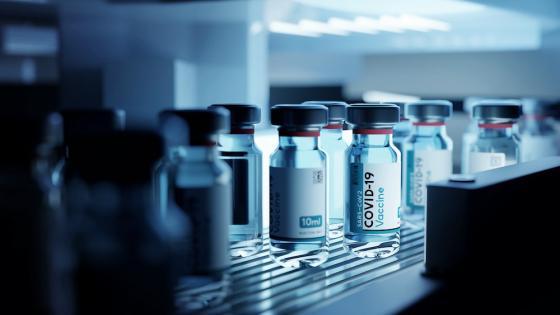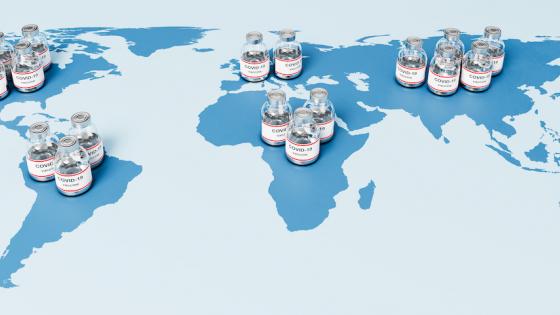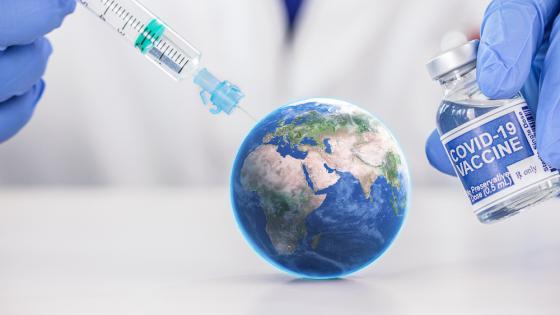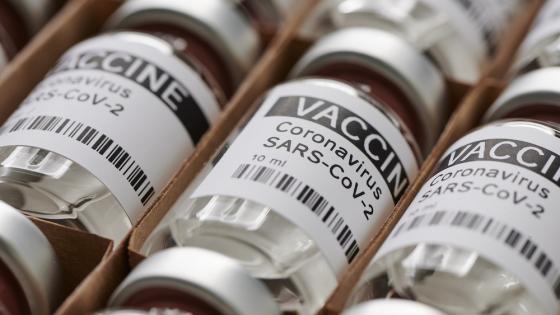The US has announced its policy of supporting a proposed temporary waiver of intellectual property rights on COVID-19-related pharmaceuticals that was discussed at a meeting of the General Council of the WTO on 5–6 May, marking a policy reversal from its previous opposition to the waiver. It is said that behind this change of course is a growing tide of international criticism, mainly among developing countries, that the monopoly on vaccines by developed countries is impeding both equitable supply and the US government's attempt to counter the ‘vaccine diplomacy’ being promoted by China and Russia. Will the policy reversal by the US actually lead to an improvement in vaccine supply?
Will a waiver of intellectual property protection promote technology transfer?
Regarding waivers of vaccine patents, there have been some voluntary initiatives. On 8 October, soon after South Africa and India proposed a waiver of the TRIPS agreement on 2 October 2020, Moderna, a US pharmaceutical company, expressed its intention not to exercise its patent rights on its COVID-19 vaccine.1 Although Moderna reached an agreement with South Korean pharmaceutical company Samsung Biologics on consignment production of the vaccine on 22 May 2021, so far there have been very few confirmed cases of efforts to reproduce Moderna's vaccine or of licenses being granted to other companies.
With respect to the COVID-19 vaccines developed by Pfizer (jointly with BioNTech of Germany) and Moderna, it appears that the whole body of relevant technical knowledge has not necessarily been patented but that some of the technical knowledge remains undisclosed as trade secrets. Patenting is only one means of ensuring ‘appropriability’, which refers to a company's capacity to secure profits from its own technological innovation. While patent information may make it possible for outsiders to achieve development results similar to those achieved by the patented technology through a similar method without infringing the patent right, keeping the technology undisclosed as a trade secret or incorporating complex processes into it may be an effective means of ensuring appropriability. Pharmaceuticals can easily be counterfeited through ‘reverse engineering’, which refers to a process in which the active ingredients of a drug are identified as a result of deformulation. Therefore, as a general rule, it is considered important to exclude the risk of counterfeiting through patenting.
While it is not clear how much of the relevant technological knowledge remains unpatented, there are apparently some technical reasons for not obtaining full patent protection. The Pfizer and Moderna vaccines use advanced technology based on messenger RNA (mRNA), representing the first case of practical application of such technology. Although I, a non-expert in this field, will refrain from going into further detail, it is highly likely that those vaccines cannot easily be counterfeited as their production requires complex production processes and unique technology.
Patenting involves public disclosure of technical knowledge, providing information on how to reproduce patented inventions. It has the function of lowering technology trade costs by clarifying property rights on technical knowledge. If the technical knowledge necessary for manufacturing a certain product remains undisclosed as a trade secret, it may not be recorded in a written or other tangible form, and it may become necessary to pass down the technical information as cumulative implicit knowledge. As a result, technology transfer may become difficult.
Perhaps in view of that risk, in April 2021, the World Health Organization (WHO) established a COVID-19 vaccine technology transfer hub as a scheme to promote the sharing of mRNA-based technology. However, there are no media reports to date indicating that technical knowledge has been provided through this scheme.2
Using data from patent applicants for drugs for the three major infectious diseases (HIV/AIDS, Tuberculosis, and Malaria), we examined the applicants for their corporate attributes and found that pharmaceutical companies that cover various disease fields have an advantage in drug development for infectious diseases (Ito and Yamagata, 2007). In the case of drug development, economies of scope may be effective. In fact, there have been many reports of drug repurposing due to similarities in the therapeutic drugs for COVID-19, and it seems that drugs used to treat a wide range of conditions may be applicable to COVID-19 treatment, with those drugs not being limited to known treatments for infectious diseases. Given the ‘economies of scope’ entailed in the development of pharmaceuticals, mRNA-based advanced technology may become applicable to other common diseases in the future. The scope of the proposed TRIPS waiver under discussion at the WTO extends beyond patent protection to include the protection of industrial designs, copyrights and undisclosed information.3 However, even if the waiver of the TRIPS agreement is applied to the Pfizer and Moderna vaccines, it remains unclear for the moment how much of the undisclosed information regarding unpatented elements will be disclosed in order to facilitate technology transfer to developing countries.
Will equitable vaccine supply be realised?
If technical knowledge regarding patented vaccines is disclosed and if it becomes possible to produce the vaccines in third-party countries, as a general rule, a supply increase would bring benefits to consumers as the elimination of a monopoly lowers prices. Among past cases, we should look at the application of the waiver of the WTO TRIPS agreement to drugs to treat HIV/AIDS in 2001. According to an estimate by Médecins Sans Frontière, the prices of patented drugs dropped to less than a tenth of the previous level in one year, improving access to the drugs around the world.4 Given that the principle of competition works, access to the COVID-19 vaccines is expected to improve.
On the other hand, the successful experience of the waiver applied to the HIV/AIDS drugs may be hard to replicate if, as the pharmaceutical industry argues, developing countries lack the technology necessary for producing and managing the vaccines, if a rapid increase in demand for the raw materials of the vaccines disrupts production around the world, or if restrictions are imposed on exports of the raw materials.5 Moreover, even if a patent waiver is applied, unrestricted dispersion of production sites would be inefficient given that the principle of economies of scale applies when fixed costs (costs of factories, storage facilities, etc.) for vaccine production are enormous. The most efficient method would probably be to concentrate production in a smaller number of particular countries with sufficient production capacity and export the vaccines from there.
Impact on Japan and Japan's position
For Japan, where vaccination is lagging, it would be desirable if a waiver of the protection of intellectual property rights on the COVID-19 vaccines led to an improvement in vaccine access. However, the proposed temporary waiver of the TRIPS agreement is primarily intended to assist countries with poor access, and therefore the impact on Japan, which has concluded purchase contracts to cover most of its needs, will be limited. Rather, Japan, which has maintained opposition to the proposed waiver, must consider what action to take in response to the US’ policy reversal.6
As Japan is preparing to realise the supply of Japanese vaccines now under development, the country will face a difficult decision between the need to secure development incentives and the expectations for the waiver. Even if the waiver of the TRIPS agreement is applied only to US-developed vaccines, vaccine producers in other countries, including Japan, are expected to be negatively affected by it due to the fact that, as a general rule, it would be desirable for producers if prices remain high across the market. However, if price competition occurs in an oligopolistic market like the market for the COVID-19 vaccines, in which the number of vaccine producers is limited, a price cut by a producer will force other producers to lower their prices as well.7
As vaccine projects are subject to externalities, they are prone to the problem of supply shortages (Kremer 2000). Advance market commitments (AMCs) to promote investment in vaccine development have been successful in supplying pneumococcal vaccine to developing countries in the past and have been applied in this pandemic.8 After the policy reversal by the US, the government of Japan announced a governmental procurement plan for domestically developed COVID-19 vaccines on 13 May as an AMC procedure. It is important to secure incentives for the development of domestic vaccines in order to prepare for future pandemics. On the other hand, unless the COVID-19 pandemic is contained everywhere in the world, prospects remain dim for the normalisation of the Japanese economy, which is internationalised in all aspects. It can be said that Japan is caught in a dilemma between the need to vaccinate the population quickly to allow for quicker return to a normal situation and the need to secure incentives for developing domestic vaccine capacity for future pandemics.
A quick solution would be to expand both production capacity and export capacity within G7 members. Castillo et al. (2021) insist on the need for additional investment to increase vaccine supply capacity because of the overwhelming global benefits of vaccines relative to their cost. Japan started to provide AstraZeneca vaccines manufactured in Japan, through the COVAX Facility (COVID-19 Vaccine Global Access Facility),9 to 15 developing countries and also to Asian countries with serious infection numbers such as Indonesia and Malaysia, based on bilateral negotiations.10 If production and export capacity were expanded within G7 members, global roll-out of Covid-19 vaccines would be accelerated by the international trading system unless restricted by excessive export restrictions.
Editor’s note: This column was reproduced with permission from the Research Institute of Economy, Trade and Industry (RIETI) with some additional information.
References
Castillo, J C, A Ahuja, S Athey et al. (2021), “Market design to accelerate COVID-19 vaccine supply”, Science 371(6534): 1107-1109.
Ito, B and T Yamagata (2007), “Who develops innovations in medicine for the poor? trends in patent applications related to medicines for HIV/AIDS, Tuberculosis, Malaria, and neglected diseases”, The Developing Economies 45(2): 141-171.
Kremer, M (2000), “Creating markets for new vaccines: Part I: Rationale”, Innovation Policy and the Economy, Vol. 1, pp. 35-72.
Kremer, M, J D Levin and C M and Snyder (2020), “Designing advance market commitments for new vaccines”, NBER Working Paper 28168.
Endnotes
1 See the Statement by Moderna on Intellectual Property Matters during the COVID-19 Pandemic.
2 https://www.who.int/news-room/articles-detail/establishment-of-a-covid-19-mrna-vaccine-technology-transfer-hub-to-scale-up-global-manufacturing
3 According to a written proposal submitted by India and South Africa in October 2020 (IP/C/W/669)
4 It is said that the prices of three antiretroviral drugs fell from $10,000 per annual dose to $700 dollars, comparable to the prices of generic drugs (https://msfaccess.org/untangling-web-antiretroviral-price-reductions-2nd-edition).
5 On 5 May, the International Federation of Pharmaceutical Manufacturers & Associations issued a statement expressing disappointment at the United States' decision to support the proposed waiver of the TRIPS agreement, arguing that the decision would lead to disruption (https://www.ifpma.org/resource-centre/ifpma-statement-on-wto-trips-intellectual-property-waiver/).
6 At a meeting of the WTO General Council on intellectual property rights in general in October, Japan expressed its intention not to support the proposed waiver of the TRIPS agreement while recognizing the need for prompt access to pharmaceuticals, arguing that the waiver would undermine development incentives. directdoc.aspx (wto.org)
7 This may be true according to an article in Nikkei Asia. Stock prices of Chinese vaccine makers fell after the U.S. announcement to support the proposal of TRIPS waiver (https://asia.nikkei.com/Spotlight/Coronavirus/COVID-vaccines/Vaccine-patent-waiver-COVID-stopper-or-innovation-killer).
8 Kremer et al. (2020) theoretically analyse advance market commitments (AMC) and show that optimal AMC design differs depending on development stages.
9 An international framework allowing high- and middle-income countries to make financial contributions for the supply of vaccines to developing countries and for the WHO and other organizations to use the financial contributions to implement joint vaccine purchases and internationally promote equitable vaccine supply. For information on the COVAX Facility, access the website of the WHO (https://www.who.int/initiatives/act-accelerator/covax).
10 The Government of Japan announced another US$800 million donation at the virtual Gavi COVAX Advance Market Commitment Summit on 2 June 2021.



